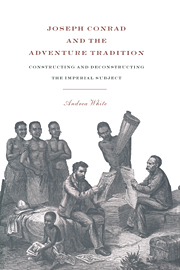Book contents
- Frontmatter
- Contents
- Acknowledgments
- Introduction
- 1 Constructing the imperial subject: nineteenth-century travel writing
- 2 Adventure fiction: a special case
- 3 Them and us: a useful and appealing fiction
- 4 The shift toward subversion: the case of H. Rider Haggard
- 5 Travel writing and adventure fiction as shaping discourses for Conrad
- 6 Almayer's Folly
- 7 An Outcast of the Islands
- 8 The African fictions (I): “An Outpost of Progress”
- 9 The African fictions (II): “Heart of Darkness”
- Coda
- Notes
- Bibliography
- Index
4 - The shift toward subversion: the case of H. Rider Haggard
Published online by Cambridge University Press: 10 December 2009
- Frontmatter
- Contents
- Acknowledgments
- Introduction
- 1 Constructing the imperial subject: nineteenth-century travel writing
- 2 Adventure fiction: a special case
- 3 Them and us: a useful and appealing fiction
- 4 The shift toward subversion: the case of H. Rider Haggard
- 5 Travel writing and adventure fiction as shaping discourses for Conrad
- 6 Almayer's Folly
- 7 An Outcast of the Islands
- 8 The African fictions (I): “An Outpost of Progress”
- 9 The African fictions (II): “Heart of Darkness”
- Coda
- Notes
- Bibliography
- Index
Summary
To better understand the shift adventure fiction underwent from a discourse that created and confirmed stereotypes supportive of British imperial ventures abroad, to one subversive of those endeavors, such as Conrad's was to become, we should look more closely at the literary context of the 1880s and 90s. As we have seen, adventure fiction had been officially approved and had admirably expressed a kind of Zeitgeist for many readers. Marryat's fiction of past and present national glories, Ballantyne's evangelical adventures, and Henty's tales of boyish pluck had occasioned only commendation, for the fiction informed, delighted, and inspired a home readership, and always sympathetically. Ballantyne gently chided his readers for not knowing their geography as they should, and Henty inserted a stern – but friendly – lecture now and again on the virtues of pluck and honesty, and thus applauded and reinforced home values. Just as the rightness of the adventurers' return to England was never questioned, so too were the readers' values never scrutinized. Adventure fiction had always supported the status quo; the arguments it advanced for continued and extended imperial activity were aimed at awakening desire, particularly in regards to Africa, rather than countering any real opposition. But Haggard's fiction, while celebrating the English adventure hero and applauding England's imperial endeavors abroad, also introduced an adversarial element, a contentious note, not present before.
While “realism” had validated adventure fiction and made it useful for promoting the imperial subject, Haggard's portrayal of savage realities was unnecessarily graphic, many readers felt.
- Type
- Chapter
- Information
- Joseph Conrad and the Adventure Tradition , pp. 82 - 99Publisher: Cambridge University PressPrint publication year: 1993



